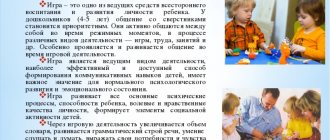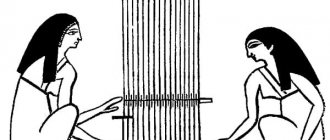Organization of play activities for children of senior preschool age
Introduction
Relevance of the work. Successfully solving educational problems requires close attention to the problems of children's play.
Currently, specialists in preschool pedagogy unanimously recognize that play, as the most important specific activity of a child, should perform general educational social functions.
Play is the most accessible type of activity for children, a way of processing impressions and knowledge received from the surrounding world. The game clearly reveals the characteristics of the child’s thinking and imagination, his emotionality, activity, and developing need for communication.
The outstanding researcher in the field of Soviet psychology L. S. Vygotsky emphasized the unique specificity of preschool play. It lies in the freedom and independence of playing combinations with strict, unconditional obedience to the rules of the game [8].
The foundation on which all of a preschooler’s play activity rests and its content is determined is the theme of the game. According to D. B. Elkonin, the theme of a game is an idea that is reflected both in speech and specific game actions. Based on the chosen theme of the game, the plot is formed. Storylines in gaming activities are children’s reflections of real life situations and episodes of interaction between people around them.
Game as a phenomenal human phenomenon is considered in most detail in pedagogy (F.K. Bleher, A.S. Ibragimova, N.M. Konysheva, M.T. Salikhova, etc.). This is because scientists view play as an important learning method for preschool children. This problem is also considered in their works by such scientists as V.I. Yadeshko, T.I. Ilyina, S.A. Kozlova and others. In their works they give recommendations on the practical use of different types of gaming activities.
Although the number of scientific works on the topic under consideration is colossal, it must be recognized that many issues within its framework have been insufficiently studied. All of the above determines the complexity of the process of organizing play activities for children of senior preschool age and the presence of problems in this area. Therefore, the process of organizing play activities for children of senior preschool age requires constant analysis, search for problems, and measures to develop means of solving these problems. In this study, the problems of organizing play activities for children of senior preschool age are associated with the use of various forms of play activities.
Object of study: play activity of preschool children.
Subject of research: forms and methods of organizing play activities for children of senior preschool age.
The purpose of the study is to consider the theoretical aspects of the problem of organizing the play activities of children of senior preschool age.
Research objectives:
- To study the concept and essence of play activity of preschoolers by means of analyzing psychological and pedagogical literature.
- Consider play activity as a factor in the personality development of children of senior preschool age.
- To characterize the forms of organizing the play activities of children of senior preschool age.
Research methods: analysis of scientific and methodological literature on the research problem, targeted observation of the process of children's development, analysis of existing programs and scientific and educational documentation.
The course work consists of an introduction, three paragraphs, a conclusion, and a list of references.
1 The concept and essence of play activities of preschool children
Preschool childhood is the first period where personality is formed. By the age of three, a child has come a long way in his mental development. It is in the process of play activity that a preschooler develops physical and spiritual strength, memory, attention, discipline and dexterity [17].
In domestic preschool pedagogy, V. A. Krutetsky and L. I. Fedorova consider the significance of the game mainly as purely didactic. The term “game” is present mainly in various combinations: “game form”, “game means”, “game technologies”. The game is used to acquire new skills, ideas, develop useful skills, etc., which naturally occurs under the guidance and control of adults.
Modern conditions for the development of education actualize the problem of forming children's play activities. The Federal State Educational Standard for Preschool Education proclaims the need to implement the educational process through the implementation of typical types of children's activities, primarily play. However, according to modern research (V.A. Derkunskaya, N.A. Korotkova, E.E. Kravtsova, E.O. Smirnova), there is a tendency for play activity to be insufficiently developed in preschool age.
According to D. B. Elkonin, play activity is the basis of social relationships, which helps resolve existing contradictions and prepares the child to implement other types of activities.
Domestic author V. A. Krutetsky, analyzing the approach of J. Piaget, notes that this author, in his own scientific works, defines play activity as a significant and vivid expression of the egocentric aspirations of children.
In modern pedagogy, the concept of play is considered as a special type of activity that originates in infancy, develops and accompanies the personality throughout life. The main directions of research into gaming activity were important for researchers in a wide variety of branches of scientific knowledge. Researchers such as L. S. Vygotsky [8], A. V. Zaporozhets, A. N. Leontiev, A. S. Makarenko, D. B. Elkonin have studied the characteristics of the play activity of older preschoolers in Russian psychological and pedagogical science. , K. D. Ushinsky.
L. S. Vygotsky formulated criteria that distinguish play activities directly from other types of children’s activities [8, p. 24].
O. S. Gazman considers gaming activity as a special sphere of human activity in which a person does not pursue any other goals other than obtaining pleasure, pleasure from the manifestation of physical and spiritual forces
According to A. S. Makarenko, play is as important for a child as work is for an adult. The formation of future activity occurs, first of all, during the game. Accordingly, the development of a particular person can be represented in the formation of play activity and its consistent transition into work activity. The founder of game theory in Russian pedagogical science, K. D. Ushinsky, noted that collective play has special educational significance, developing social activity skills in preschoolers and causing initial associations with social relations.
The significance of play as a leading activity for a child of primary preschool age is determined by the fact that it ensures the success of the child’s personality development [21].
Play activities are of great importance for the development of preschool children.
At the early stages of mastering the game, the simplest game chains of children can be organized on the basis of the rhythm of repetition and are represented by a set of repeated objective and serial speech actions (imitative repeated syllables, sound complexes, etc.). In primary and middle preschool age, children play short game chains with individual accented links, accompanied by a word, simple or extended phrase, which indicates the manifestation of the rhythm of alternation in the child’s play activity. If in older preschool age chains of play actions show signs of plot, and speech means begin to perform a substitute function, then we can say that the play activity of a preschooler is organized on the basis of a symmetry rhythm [26].
The play activity of a preschooler is a complex psychological phenomenon, the general structure of which is determined according to the basic principles of the classical, domestic theory of activity. The unit of play of a preschooler remains a play action that performs the main substitutive function. In addition, in the structure of play activity one can distinguish the theme, design, plot of the game, etc. An important component of the play activity of a preschooler is its spatio-temporal organization.
Understanding the play activity of a preschooler as a psychological and pedagogical phenomenon is necessary for the successful implementation of the process of upbringing and training of preschoolers and becomes of great importance when addressing the issues of meeting the special educational needs of children with developmental problems.
The federal state educational standard for preschool education sets a new goal for teachers - creating conditions for full support of children’s self-disclosure and their positive socialization in conditions of individualization. As priority conditions, the Federal State Educational Standard for Preschool Education focuses teachers on ensuring emotional well-being through direct communication with each child and respectful attitude towards him, his feelings and needs, supporting the individuality and initiative of children, which implies the possibility of free choice of activities and its participants, development of independence in different types of activities.
It is also necessary to pay attention to the role of the teacher when organizing play activities in a group of different ages.
The social position of the teacher is that of a senior partner. Equal partnerships are built only on recognition and respect for each other. When setting goals for the development of children's play activities in a mixed-age group, the emphasis is on using the conditions of a mixed-age community to develop play. A child, regardless of age or level of gaming abilities, is completely immersed in the playing field of interaction of different ages. Each participant in the game is aware of who he is in the game and why, and understands the interdependence of each other’s game roles.
The role of the teacher at the first stage: in the process of communication and observation, help determine the range of interests and preferences of all children [18].
At the second stage, determine the degree of development of play skills in children in accordance with age, build an individual play route for the child, taking into account the provision of assistance (the possibility of self-education of the child himself, mutual learning in the process of interaction with a partner (older child, teacher), the possibility of using natural circumstances, arising during the game).
The role of the teacher: observe, analyze, and, if necessary, make adjustments to the organization of the RPES, taking into account the interests and needs of both the child and the microgroup of children, indirectly express his attitude when the need arises. You can enter the game as a partner, not forgetting to clarify your gaming rights [11].
During game interaction, it is necessary to discuss the relationships that develop in a particular game. From the perspective of older children: discuss successes, failures, emerging new role relationships. From the perspective of younger children: independence skills, the dependence of success on the help and support of older children. The change in direct impact on pedagogical, play assistance and indirect impact allows us to talk about the possibilities of independent development of a child’s play abilities. The transition of children to free play automatically gives rise to high responsibility of the participants not only to each other, but also to the teacher. This is a qualitatively new level of relations between children and teachers, and its full implementation is possible only in a group of different ages.
Thus, there is a shift in the teacher’s position from the direct organizer and leader of children’s joint play to the position of the organizer and leader of the child’s advancement from play to educational areas and back, which is one of the conditions for the child’s real opportunity for self-development, self-education, and self-education.
2 The role of play activities in the development of older preschoolers
In preschool age, play performs the function of social learning; this is due to the fact that the child, when performing manipulations with objects, tries to repeat the actions and movements of an adult. At this time, the child is driven by the social instinct received from our primate ancestors and primitive people. Since this method was at that time the only way to transmit information that was very valuable and important for survival. (How to get food, what not to eat, which animals are dangerous, how to treat wounds, and so on). And despite the fact that our society has evolved and uses different means of storing, transmitting and reproducing information, the brain and psyche of a child develop according to the same rules and uses the same mechanisms as their ancestors [12].
Play is the main activity of a preschooler. The child spends most of his time playing, and normally the game becomes much more complicated over the course of 3 years [14].
In the process of gaming activity, mental abilities develop. The child learns to act with a substitute object, that is, he gives it a new name and acts in accordance with this name. The appearance of a substitute object becomes a support for the development of thinking. If at first, with the help of substitute objects, the child learns to think about a real object, then over time, actions with substitute objects decrease and the child learns to act with real objects. There is a smooth transition to thinking in terms of ideas.
During the role-playing game, imagination develops. From replacing some objects with others and the ability to take on different roles, the child moves on to identifying objects and actions with them in his imagination. For example, six-year-old Masha, looking at a photograph of a girl who rests her finger on her cheek and thoughtfully looks at a doll sitting near a toy sewing machine, says: “The girl thinks as if her doll is sewing.” Based on this statement, one can judge the girl’s typical way of playing.
Play also influences a child’s personal development. In the game, he reflects and tries on the behavior and relationships of significant adults, who at this moment act as a model of his own behavior. Basic communication skills with peers are formed, feelings and volitional regulation of behavior are developing.
Reflective thinking begins to develop. Reflection is a person’s ability to analyze his actions, actions, motives and correlate them with universal human values, as well as with the actions, actions and motives of other people. The game promotes the development of reflection because it makes it possible to control how an action that is part of the communication process is performed. For example, when playing hospital, a child cries and suffers, playing the role of a patient. He gets satisfaction from this because he believes that he played the role well.
Interest in drawing and design arises. At first, this interest manifests itself in a playful form: the child, while drawing, acts out a certain plot, for example, the animals he has drawn fight among themselves, catch up with each other, people go home, the wind blows away apples hanging on the trees, etc. Gradually, the drawing is transferred to the result of the action , and a drawing is born.
Learning activities begin to take shape within the play activity. Elements of educational activities do not arise in the game; they are introduced by an adult. The child begins to learn through play and therefore treats learning activities as role play, and soon masters some learning activities.
Thus, young children manipulate objects, have low interest in playing together, and react minimally to peers present. In this case, the adult most often adapts to the child’s range of interests and follows him. But already in middle preschool age, the child begins to demonstrate preferences in play; basically, he chooses a play partner, focusing on personal sympathy.
Closer to older preschool age, the child is interested in role-playing games and in the preparatory group of kindergarten, children play board games according to the rules with great interest.
Thus, through play, the child gains a lot of experience, which he will use later.
It is important to understand that the play of children of senior preschool age should be based on emotionally rich, varied everyday life. That is, the plots should be familiar and visual, they should respond with real experiences, this will allow the child to react to the experience, gain the necessary knowledge and consolidate skills, resolve the scale of the perceived plot from emotion, impression, thought and to the installation in the end. Thus, children “re-experience” their life experiences in play, and the variability of play situations depends on how full their lives are, which subsequently affects individual personal characteristics (character, values, motivational sphere).
The pedagogical potential of the game increases if the child’s experience is enriched, he is taken to different places (exhibitions, performances, parks), and adults are involved in work (doable household chores, which not only help enrich the experience of interacting with people, but also give important skills, and also influence to form a sense of personal belonging to a family, clan, homeland). Involving a child in creativity is especially important; it is creation at a level accessible to the child that serves as an important way to demonstrate internalized knowledge, skills, and abilities, as well as to determine the attitude of children of senior preschool age to this. It is also important to guide parents to use a variety of materials, because this enriches the child’s internal sensory experience [15].
When organizing the zone of proximal development, it is important to pay special attention to the functional load of the subject-spatial environment. That is, the objects surrounding the child should give him the opportunity to use them multifunctionally, model them, and the space should be easily modernized.
The play of older preschool children should have its own ritual. Many parents, thanks to their experience, understand the importance of rituals in a child’s life. First, the idea of the game arises, the creation of the environment or transformation, the game itself, after which there must be a conclusion to the game and the removal of roles. Compliance with this ritual will allow children to form a clear boundary between reality and fiction. It will teach children not to transfer gaming relationships into everyday ones, but at the same time, to gain such important experience.
The pedagogical possibilities of games are certainly unique. Their influence on the personality of a preschooler is multifaceted and multi-level. These games are distinguished by their aesthetics, are fundamental for enriching the emotionally sensitive, motivational sphere, and are valuable for their ability to influence biological rhythms. But the most important thing that sets this group of games apart is the simplicity and accessibility, and the infectiousness of the tasks. Children are easily involved and reproduce the images they like, not only in the form of singing, music or dancing. But also in the form of visual and applied creativity (crafts, drawings, playing out plots in role-playing games) [19, p. 131].
What are the specifics of organizing activities in a group of different ages, including the priority type of children's activity - play?
Research by teachers and psychologists (T. N. Doronova, V. G. Shchur, V. N. Butenko, E. N. Gerasimova, etc.) regarding the development of pedagogical foundations for designing educational activities for preschoolers shows that the group is the most natural and psychological a comfortable environment for the development of a child - preschooler. A distinctive feature of the group is a qualitatively new social experience of interpersonal relationships. The natural organization of everyday life in a group of different ages allows a preschooler to understand and accept another child, regardless of age, to master and enrich his social experience. The child’s own “I” is closely intertwined with the multi-age community “They”, “We”, its transformation in new social conditions. Mastering a real role position when organizing joint activities of children is the most important integrated indicator of a child’s social and play experience.
In a mixed-age group, the teacher has a unique opportunity, using the example of older children, to model the development prospects of a younger child. When organizing joint play activities, the youngest child chooses for himself: to be outside of this activity, to be nearby, or to be together. To do this, you not only need to want, but you need to know and be able to. The older child has the opportunity to tell, show, and explain to the younger one what he knows and can do himself, which greatly not only helps to consolidate what he has previously learned, but also to enrich and expand his social experience. The conditions of a mixed-age group contribute to the expansion of a child’s independent cultural practices, regardless of age, social and play position [27].
To find out what gaming skills have been developed in children, at the beginning of the year, the teacher unobtrusively, through conversations, discussions, involving children in various gaming situations, observations, and interaction with parents, determines what games children in kindergarten like, how often and on whose initiative they are organized, which ones are played at home with parents, older brothers, sisters, in the yard. The obtained result helps the teacher model the conditions for developing interest in the game for all participants in the educational process. Why the emphasis on parents? If play is a natural state for a preschool child, then parents treat it as something secondary, forgetting that they themselves were children and they also had favorite games. Children play not only in kindergarten, but also at home, where they also need help making things, giving advice, looking up something in the encyclopedia, the Internet. We believe that interaction with parents and older brothers and sisters is very important for enriching the social play experience of children.
An important component of the development of children’s play activity in a mixed-age group is the creation of conditions, one of which is a developing subject-spatial environment that meets modern requirements in accordance with the Federal State Educational Standard for Education.
The teacher needs to provide for the occupancy and maintenance of play centers based on the age and individual characteristics of the children, taking into account that these groups contain children with special educational needs. Particular emphasis should be placed on the developmental potential of the equipment presented (for example, in the Center for Constructive Activity there should be a construction set of different sizes, different materials and orientations (Lego), thematic sets of parts, building diagrams). The presented equipment must comply with the principles of versatility, accessibility, safety, and transformability depending on the interests of children. The organization of play activities in this center contributes to the fact that younger children receive help not only from the teacher, but also from older children, who, due to their play experience, can already provide them with help and support in choosing the necessary material, equipment, and determining the sequence of work in accordance with the proposed scheme.
In a mixed-age group, a child has a real opportunity to be [29]:
- senior partner, he takes this position when he realizes his seniority in age, in having extensive gaming experience, the desire and desire to provide help to those who need it;
- mentor: this role position is based on personal relationships. The older child has experience and knowledge in organizing games of various types; he recognizes the younger child as an equal partner in the game. The game teaches him certain rules and actions. The individualization of education is clearly visible here.
Thus, this type of game smoothly intertwines with many game forms, making significant changes in the experience of children and in the development of their personality.
Literature:
- Arsiriy, A. T. Materials on entertaining grammar of the Russian language [Text] / A. T. Arsiriy. Part II. -M.: Education, 1997. -320 p.
- Bandura, A. Social learning theory [Text]/ A. Bandura. - M.: Express, 2001.- P. 49.
- Barannikova, L. I. Basic information about the language [Text] / L. I. Barannikova. - M.: Education, 1972. -531 p.
- Bebeshina, N.N., Sviridenkov V.P. Development of speech in Russian language lessons [Text] / N.N. Bebeshina. - M.: Higher preschool educational institution, 2008. - 244 p.
- Betenkova, N. M., Fonin D. S. Games and entertaining exercises in Russian language lessons [Text] / N. M. Betenkova. - M.: AST: Astrel, 1998. 152 p.
- Valchuk, E. V. Work on phraseology in Russian language lessons and extracurricular activities in preschool educational institutions [Text] / E. V. Valchuk. - M.: Education, 1989. - 190 p.
- Volkova, T. N. New forms of organizing teaching in Russian language lessons [Text] / T. N. Volkova. - Ivanovo, 1991. -231 p.
- Vygotsky, L. S. Psychology [Text] / L. S. Vygotsky. - M.: Labyrinth, 2000. -312 p.
- Golovin, B. N. Fundamentals of speech culture [Text] / B. N. Golovin. - M.: Higher preschool educational institution, 1980. - 432 p.
- Grigoriev, D.V. Extracurricular activities in the context of the Federal State Educational Standard [Text] / D.V. Grigoriev. - M.: Education, 2014. 122 p.
- Grigoryan, L. T. Language is the key to knowledge. (Materials for extracurricular work in the Russian language) [Text]/ L. T. Grigoryan. - M.: Education, 1968. -215 p.
- Gryzlova, M. L. Extracurricular work in the Russian language [Text] / M. L. Gryzlova. - M.: Pedagogy, 2000. -333 p.
- Guryanova, E. V. Speech development of primary school children [Text] / E. V. Guryanova. - M.: Education, 1994. - P. 69.
- Children's literature [Text]/ Ed. E. E. Zabareva. - M.: Education, 1985. -399 p.
- Egorova, T. G. Formation of reading activity of older preschoolers [Text] / T. G. Egorova. -M.: Logos, 2003. -S. 12–13.
- Zhinkin, N. I. Psychological foundations of speech development // In defense of the living word [Text] / N. I. Zhinkin. - M.: Education, 1996. -P. 5–25.
- Entertaining ABC [Text] / Comp. V. Volina. - M.: Education, 1991. -344 p.
- Zaretsky, A. I. Materials on entertaining grammar of the Russian language [Text] / A. I. Zaretsky. - M.: Education, 1991. -332 p.
- Ignatiev, E.I., Lukin I.S., Gromov M.D. Psychology [Text] / E.I. Ignatiev. - M.: Education, 2005. -S. 33–39.
- Kazakova, V. I. Development of expressive speech of older preschoolers [Text]. Ekaterinburg, 1998. -161 p.
- Lvov, M. R. Fundamentals of speech theory [Text] / M. R. Lvov. - M.: Academy, 2000. -248 p.
- Lvova, S. I. Language in speech communication: Optional course [Text] / S. I. Lvova. - M.: Education, 1991. -119 p.
- Makarov, A. P. Entertaining grammar. (Materials for extracurricular work in the Russian language) [Text] / A. P. Makarov. - Ulyanovsk: Ulyanovsk book. publishing house, 1959. - 167 p.
- Maklakov, A. G. General psychology [Text] / A. G. Maklakov. - St. Petersburg: Peter, 2007. -S. 218.
- Methods of teaching the Russian language [Text] / M. T. Baranov, T. A. Ladyzhenskaya, M. R. Lvov and others; edited by M. T. Baranova. - M.: Education, 1990. - 556 p.
- Methods of speech development in Russian language lessons [Text]/ Ed. T. A. Ladyzhenskaya. - M.: Education, 1991. -P. 65–67.
- Mukhina, V. S. Developmental psychology [Text] / V. S. Mukhina. - M.: Academy, 2008. - P. 98–99.
- Morkovkin, V.V. Experience of ideographic description of vocabulary [Text] / V.V. Morkovkin. - M.: Moscow State University Publishing House, 1997. -P. 121.
- Napolnova, T.V. Activation of children’s mental activity in Russian language lessons [Text] / T.V. Napolnova. - M.: Education, 1982. - 247 p.
- Psychology [Text] / Ed. A. A. Krylova.- M.: PBOYUL Grinenko E. M., 2000.- P. 228–229.
- Rosenthal, D.E., Golub I.B., Telenkova M.A. Modern Russian language [Text] / D.E. Rosenthal. - M.: Delo, 2002.- P. 64–68.
- Rubinstein, S. L. Fundamentals of general psychology [Text] / S. L. Rubinstein. - St. Petersburg: Peter, 2000. -720 p.
- Rumyantseva, I.M. Psychology of speech and linguistic-pedagogical psychology [Text] / I.M. Rumyantseva. - SP.: Rech, 2003. -S. 118.
- Selezneva, E. P. Development of children’s speech [Text] / E. P. Selezneva. - M.: Education, 2004. - P. 77–78.
- Sysoeva, S.V. Lexico-phraseological analysis of text as a means of speech development for older preschoolers [Text] / S.V. Sysoeva. - Ryazan, 1999. -172 p.
- Ushakov, N. N. Extracurricular activities in the Russian language in primary classes. Manual for teachers [Text] / N. N. Ushakov. - M.: Education, 1978. - 344 p.
The role of play in child development
Playing is a mandatory activity for a child.
- It liberates him, so the baby plays with pleasure and without coercion. From the first weeks of life, the baby is already trying to interact with the rattles suspended above his crib.
- In preschool age, play activities teach children order and observance of rules.
- During the game, children strive to demonstrate all their skills (especially when playing with peers).
- Passion appears, many abilities are activated, the game creates an environment around the baby, helps to find friends and establish contacts.
- While playing, the child learns to find a way out and solve problems.
- The rules of the game teach him to be honest, and when they are violated, there follows general indignation among the players.
- A child can show qualities in play that are invisible in everyday life.
- In addition, the game reveals rivalry between children, which will help them defend their position and survive.
- Games have a beneficial effect on the development of imagination, thinking and wit.
- Gradually, through play activities, the child prepares to enter adulthood.
Didactic games
The most important importance of play activity is the development of children in its process. Didactic games conducted by teachers directly serve this purpose. These games are specially invented for training and education; they have certain rules and a specific result is expected. In fact, a didactic game is a synthesis of a form of learning and play. It sets didactic tasks, defines rules and game actions, and predicts the result. The didactic task refers to the educational impact and purpose of learning. It is well demonstrated by games that reinforce the ability to form words from letters or counting skills. The task in a didactic game is carried out through game actions. The game is based on the play actions carried out by the children themselves. The more interesting these actions are, the more effective and exciting the game will be. The teacher who controls the behavior of children sets the rules of the game. When the game ends, it is necessary to sum up its results. This may mean determining the winners who completed the task best, but at the same time it is necessary to encourage each participant in the game. Adults use didactic games as a way of learning, allowing a smooth transition from gaming to educational activities.
Games for preschoolers
The age of preschoolers can be divided conditionally into younger and older. At a young age, children's games are aimed at learning the properties of things and various connections. By the senior preschool period, children have new needs, so preference is given to role-playing games with peers. Already in the third year of life, children develop an interest in group games. Cognitive, active or manipulative games occupy a significant place in the preschool period. Children love to play with construction sets, as well as with a variety of available materials (household furniture, sand, clothes, etc.). At the beginning, collective play, in fact, is not such a thing - each child plays on his own with his own toys, not paying attention to the children playing nearby. However, at some point it suddenly turns out that the game is already general, with certain rules and aimed at solving the problem set by the children themselves. Gradually, preschoolers' play activities change noticeably - their creativity begins to develop, and they want to share it. Children exhibit organizational abilities to varying degrees; they already need play with a plot. Older preschoolers begin to be attracted to games that reflect the lives of adults; the most typical of these can be called games of “mother-daughter,” “school,” and “hospital.”
Play and development of children's speech
Play even significantly influences the development of a child’s speech. A minimum level of communication skills is necessary so that the child can confidently connect to a gaming situation. Thanks to the need to communicate with other children, the development of coherent speech is stimulated. In play, which is the leading form of activity at this age, the sign function of speech intensively develops due to the replacement of one object with another. Placeholder objects serve as symbols for missing items. Any real object that replaces another object can serve as a sign. The proxy object transforms the verbal definition by associating the word with the missing object. Thanks to play, the child begins to perceive individual and iconic signs. In iconic signs, the sensory properties are virtually close to the object being replaced, and the sensory nature of individual signs has little connection with the designated object. Games are also important for developing reflective thinking. For example, a child playing hospital cries and suffers like a patient, although internally he enjoys playing the role.
The influence of play on the development of a child’s psyche
Increasing the complexity of play activities contributes to the development of the child’s psyche. With the help of the game, the mental qualities and personal characteristics of the child are formed. Over time, other activities sprout from the game and become important in a person’s subsequent life. The game perfectly develops memory and attention, since in it the child needs to focus on details in order to successfully immerse himself in a game situation. Role-playing games develop imagination. Trying on different roles, the child creates new situations and replaces some objects with others. The influence of gaming activities on the development of the personality of a child, who acquires communication skills, learns to establish contacts with peers, and studies the behavior and relationships of adults, has been noted. Drawing and designing are very close to play activities. At the same time, they also include preparation for work. The child tries, doing something with his own hands, but he is not indifferent to the result. During these activities, he should definitely be praised, because praise will become a new incentive for him to achieve perfection. In a child’s life, play is as important as work for an adult or study for a schoolchild. Educators know this, but it is important for parents to understand this as well. Children's interests need to be developed in every possible way, their focus on achieving better results and victory should be encouraged. As the baby grows, he needs to be offered toys that will help him progress mentally. Parents should sometimes play with their child, because he perceives joint play as more important.





